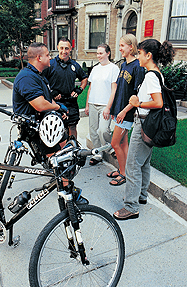![]()
Departments
![]()

|
Week of 10 September 1999 |
Vol. III, No. 5 |
Feature
Article
Bike officers a visible force on campus
By David J. Craig
On a calm day last fall, two men known to police as drug users stood near a pay phone on Commonwealth Avenue, nervously surveying their surroundings. The men appeared to be drinking alcohol from open containers, so BU police officer Larry Cuzzi, who was observing them from just a few feet away, arrested them.
|
|
|
BU mountain bike police officers
Larry Cuzzi and Brian Abdallah chat with Julie
Weldon (COM'00), Lauren Clack (ENG'00), and Mary
Ellen Vinci (CAS'00) outside The Castle last week.
Photo by Kalman Zabarsky
|
"Those guys were totally unaware I was there," Cuzzi says. "I was on top of them before they knew who I was. I've made a lot of drug arrests like that. Criminals are usually looking out for a cruiser to go by, not a mountain bike."
The BU Police Department's mountain bike unit, which has grown from one officer in 1993 to seven this year, is an integral part of campus crime prevention.
Police say the mountain bike unit is partly responsible for a decrease in property crimes at BU during the past three years. From the 1996-97 school year to the 1998-99 school year, the number of burglaries was down from 50 to 47, larcenies were down from 559 to 371, and vehicle thefts dropped from 9 to 6.
Part of the reason property crime rates have dropped, BU police say, is the increase in the number of officers on the street, from about three each shift in 1993 to six per shift now. But the mountain bike unit in particular has given BU police a new crime-fighting tool.
"We can cover more areas on a bike," explains Officer John Ryan, a five-year veteran of the department, who has been a member of the mountain bike unit for two years. "And we have more of a quality of stealth."
Police are looking to mountain bike officers to help them control violent crimes as well. While property crimes have declined recently, the number of assaults that BU police handle has increased from 26 in the 1996-97 school year to 68 in the 1998-99 school year. BU police, in conjunction with the Cambridge and Boston police departments, will participate in September in a Massachusetts State Police initiative that will ensure that the Esplanade, where many violent crimes occur, will be patrolled by at least one mountain bike officer at all times.
In addition to allowing police officers greater mobility, mountain bikes also increase the presence of officers in the community, which is an important aspect of fighting and preventing crime, says BUPD spokesman Sergeant Jack St. Hillaire.
"Ninety percent of crimes that are solved get solved not because of fingerprints or fancy methods like that," he says. "They are solved with information people give us. And that requires that we have a good rapport with people."
According to some students, the mountain bike unit so far has been successful toward that end.
"I think the mountain bikes are beneficial because it makes the officers seem less intimidating," says Nate Howe (CAS'01) who lives in Warren Towers. "If you walk up to the window of a cruiser to talk to an officer, the car gives them their own territory. But if the officer is on a bike, it's more one-on-one. It's like you're on the same plane."
BU police routinely have two mountain bike officers on the street from eight a.m. to midnight, one at the Charles River Campus and one at the BU Medical Center Campus in the South End. When they are not giving crime prevention talks to local resident, business, and student groups, they are hitting the streets like the neighborhood beat cops who went out of style decades ago, but are making a return in many cities because of their effectiveness.
Pam Beale, owner of Cornwall's Restaurant in Kenmore Square for 15 years, says that within the past 18 months the once crime-prone square has become safer, in large part because BU mountain bike officers now are familiar faces.
"I see the officers around on bikes all the time," Beale says. "They'll come in and chat with people. They end up handling a lot of our common problems like pickpocketing and panhandling. Kenmore used to be a lot worse, and if those officers weren't around as much, I think the scales could tip back the other way."
And the advice officers offer students? Use your head.
"A lot of crime prevention is just common sense," explains Officer Peter Shin, who has been a member of the BUPD for five years and a mountain bike officer for three. "If you go somewhere, lock your door. New students here aren't used to locking their doors at home, and all of a sudden there are 15,000 other students living with them. And some of them see that as an opportunity."
Five-year BUPD veteran James Coady concurs. "I think people get to campus and they have a false sense of security," he says. "They're here to concentrate on academics, and that's what they spend their time thinking about when they're walking through campus. But criminals see the University as a good opportunity for crime. So if you're walking down the street and have a purse, put it over your shoulder and don't look susceptible. If you see a group of males approaching and you feel something isn't right, pay attention to your instincts and cross the street and go to a well-lit area. There are more than 60 blue call boxes around here you can call police from."
